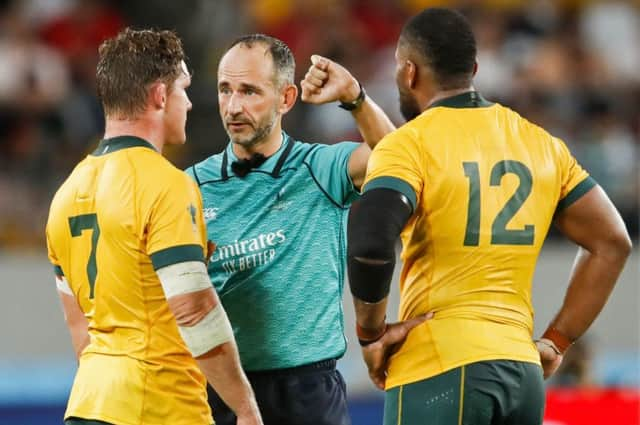Allan Massie: Change the laws to eliminate high tackles


Otherwise, much of the commentary on the tournament has been devoted to the refereeing of matches and, in consequence, to the time games are taking, with, in some cases, half-time arriving on or very near the hour mark. This is unsatisfactory, even though the oppressive heat and humidity may mean that players are happy to be given two or three minutes rest while the referee on the field and the TMO debate rights and wrongs.
World Rugby’s laudable determination to clamp down on dangerous tackles and any contact with the head has led to confusion and inconsistency. Australia’s coach, Michael Cheika, may come across as a man never happier than when nursing a grievance, but his bemusement and indignation when Samu Kerevi was penalised for running hard with the ball held in his arm across his chest and straight into the Welsh stand-off Rhys Patchell were understandable. The point is that Patchell, a tall man (for a stand-off anyway) was standing upright and Kerevi had nowhere else to go. Any tackle from Patchell was going to be high and so any contact between Kerevi’s ball-carrying arm and Patchell was also going to be high. In Cheika’s view, the clash was no different from the one between his wing Reece Hodge and the Fijian Peceli Yato, for which Hodge was belatedly punished, cited and suspended. I thought the Hodge tackle marginally worse, certainly more dangerous, but there was little in it – except of course that Yato was concussed and neither Kerevi nor Patchell was injured.
Advertisement
Hide AdAdvertisement
Hide AdConsistency is desirable, but more desirable is a change in the law. Foolishly, the law now actually encourages players to tackle high, to remain on their feet and prevent the ball-carrier from going to ground, because if the tackler succeeds in doing so, his side will be awarded the put-in at a subsequent scrum. Moreover, the high tackle makes off-loading – that is, passing the ball out of the tackle – more difficult. In contrast, when a player is brought to ground by a classic low tackle, his side will usually manage to retain possession at what passes these days for a ruck. Lastly, a change in the law more than 20 years ago in the interest of free-flowing rugby permitted the tackled player to pass off the ground, something easier to do if tackled low. Previously, passing off the ground after the tackle was a penalty offence.
My point is this: high-tackling pays and so coaches encourage it. If you want to eliminate high tackles, or at least reduce the number of them, then amend the laws so that low tackling pays better.
The perceived failure to penalise players who stray offside has been the other talking point. It should be made clear that the responsibility of spotting offside rests with the assistant referees, who are in a position to say to the man in the middle: “Green 12 offside.” Instead, there is talk of introducing Hawk-Eye technology to police the (always shifting) offside line. God help us! How long do they want matches to last? Anyone who has seen the time taken in cricket to determine whether or not a bowler has bowled a no-ball must regard this as a crazy notion.
Meanwhile, Scotland are preparing for their match against Russia, one in which victory with a four-try bonus point is imperative, even if Samoa upset Japan’s apple-cart today. With only a four-day turnaround before we play Japan a week tomorrow, one assumes that Gregor Townsend will trust his reserve strength. The interesting question may be who starts at scrum-half: George Horne or Henry Pyrgos? Given that he will surely want Horne fit and eager to come on for the last half-hour or 20 minutes against Japan, there’s an argument for starting with the experienced and skilful game-manager Pyrgos against Russia. On the other hand, Horne and Adam Hastings are an established partnership and, remembering how they ran riot against Argentina in Resistencia in June last year, the prospect of seeing them paired against the Russians is enticing. Moreover, it’s likely there would be experienced players around them ready to utter wise words, John Barclay and Ryan Wilson in the back row of the scrum and young George’s brother Peter at 12.